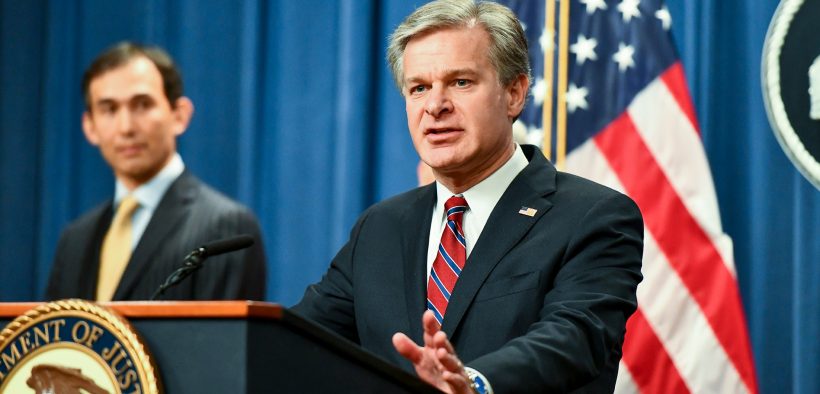Why Has the FBI Become So Political?
Share

Many Americans are troubled by FBI investigations that have interfered in elections. A recent Trafalgar Group poll found that 46.2 percent of American voters believe the Department of Justice and the FBI to be “too political, corrupt, and not to be trusted.”
When I was growing up, my family knew several FBI agents. They were straight arrows, men of integrity — the embodiment of the agents in movies depicted by Kevin Costner and Jimmy Stewart.
Sadly, that sterling reputation has become tarnished.
I have spent the last few months trying to figure out what has changed in the culture of the FBI such that its top executives would thrust the bureau into elections. I have read hundreds of articles and documents as well as interviewed many former employees of the DOJ and the FBI. I have concluded that two pivotal events dramatically changed the culture of the FBI and paved the way for its top executives to insert the bureau into politics.
First Pivotal Event: Hoover’s Death
The death of J. Edgar Hoover in 1972 brought about a total change in the culture of the FBI. A good friend who served as an FBI agent for over two decades gave me a cogent explanation of how Hoover’s death opened the door to political maneuvering within the bureau.
Politicians in both parties decided that they had to prevent future FBI directors from holding their “indiscretions” over their heads as Hoover had done. William C. Sullivan, the third official in rank under Hoover’s regime, explained: “The moment [Hoover] would get something on a senator, he’d send one of the errand boys up and advise the senator that ‘we’re in the course of an investigation, and we by chance happened to come up with this data on your daughter. But we wanted you to know this. We realize you’d want to know it.’” The politicians got the message: Don’t cross Hoover, or your dirty laundry will be exposed. (READ MORE: The Real Legacy of J. Edgar Hoover)
To avoid being leveraged by future directors, President Richard Nixon and leaders of both parties decided that from that point forward directors of the FBI would be weak leaders.
Clarence M. Kelley was appointed as the first post-Hoover director. He was a nebbish who was a good fit for what the politicians were seeking. He had been chief of police in Kansas City, where he had managed a $23 million budget and a few dozen investigators. After Kelley was appointed director, he had to manage the FBI’s budget of about 15 times that amount (over $336 million) and oversee several thousand agents, plus thousands of support personnel.
My friend, the former agent, went on to explain that under Hoover the FBI was a paramilitary organization — a pyramid with Hoover at the top as the dominating presence. Following Hoover’s death, the top of the pyramid was lopped off, leaving a vacuum.
If Kelley had been a strong leader, he would have filled it. However, because he wasn’t, the top FBI executives on the seventh floor of the FBI headquarters isolated him so that they could control the flow of information sent to Kelley. They cut him off from what was actually happening in the field and treated him like a mushroom: in the dark and covered with manure.
They were ambitious, and they soon were maneuvering to replace Kelley as a new director. The senior executives began cozying up to rising-star politicians who would appoint one of them director of the FBI if elected president.
These ambitious bureaucrats earned the gratitude of those political patrons by investigating their potential opponents, digging for dirt on the rivals and their family, close advisers, and major contributors. In essence, they were political “hitmen” looking to target their chosen politician’s challengers.
The FBI bigwigs leaked word that the opponents and their supporters were under investigation, hoping that the stories the FBI planted “on background” would cause the supporters to abandon helping the rival.
A good example of the impact these underhanded tactics have had on politics is the prosecution of former Virginia Gov. Bob McDonnell. McDonnell’s prosecution was thrown out by a unanimous Supreme Court. However, the court’s decision came long after McDonnell’s hopes of becoming president had collapsed.
To get a good picture of how such dishonest tactics are used against innocent people, I recommend renting the movie Absence of Malice, which stars Paul Newman and Sally Field in a stark portrayal of how the lives of innocent people can be turned upside down by an ambitious and dishonest U.S. attorney.
Second Pivotal Event: The 9/11 Attacks
The 9/11 attacks brought an immediate change in the FBI that had profound effects on its culture. When President George W. Bush gathered his advisers at Camp David in the days after the attacks, he asked then–FBI Director Robert Mueller what the bureau was doing to prevent the next terrorist attack. Mueller was caught off guard. He had no answer for the president.
Mueller couldn’t answer Bush because it had never been part of the bureau’s mission to prevent terrorist attacks. The FBI’s job had always been to solve attacks after they were committed. The bureau didn’t predict crimes; it worked to find those responsible after crimes were committed.
However, the humiliated Mueller was quick to promise the president that he would get right on it. Mueller’s promise grafted onto the bureau an entirely new and unfamiliar responsibility. But he didn’t have the foggiest idea how the added responsibility could be tacked onto the FBI’s law enforcement function.
That decision brought with it a dramatic change in the culture — and the structure — of the bureau. Overnight, the FBI had to serve as both a law enforcement agency and a national security agency, two functions that require entirely different skills and training.
Because intelligence is gathered in scattered locations and often consists of tiny bits of seemingly unrelated information, reports from field agents have to be collected and analyzed at a central location, the directors of which control assignments for the field based on their assessment. This centralization required a reversal of the relationship between field agents and headquarters executives. Prior to 9/11, local field offices had the authority to decide what crimes to investigate and prosecute under the direction of the local U.S. attorney.
Up until the attacks, the bureau had 56 field offices. They operated relatively autonomously and focused on solving crimes in their office’s jurisdiction. This “office-of-origin” process directed that investigations started by a field office would remain in the charge of that office if the investigation expanded into other districts. Headquarters in D.C. only served to coordinate investigations across offices.
After 9/11, that dispersed authority was reversed, and D.C. took control of investigations. From that point on, the Washington bigwigs controlled and coordinated investigations. By shifting authority from the field to the headquarters, the politics-focused Washington brass were able to instigate and control investigations — including those that impacted elections.
With control of investigations tightly in the hands of the seventh-floor executives in Washington, FBI investigations began to impact political campaigns more frequently. In fact, the FBI has interfered in the last four national elections.
In 2016, the FBI used a dossier that it knew was paid for by the Clinton campaign to obtain warrants to spy on the Trump campaign. The bureau knew that the dossier was not verified. Yet, the FBI executives were so eager to start their spying operation that they misled the court, claiming that they had confidence in the dossier. Evidence only recently surfaced that the FBI offered $1 million for the verification of the information in the dossier. No one was able to collect that “fee” because the information was fiction.
The DOJ’s zeal in asking the court to allow its spying operation to begin was such that one DOJ employee altered a document to mislead the court. He was later convicted for this underhanded tactic.
In 2018, the Mueller team of FBI agents repeatedly planted stories claiming they had solid evidence of Trump’s collusion with Russia. Those leaks turned out to be false. But these inaccurate stories served their purpose; they kept Republicans on the defensive throughout the midterm campaign. It wasn’t until about four months after the election that Mueller released his findings revealing that he had no evidence that the Trump campaign conspired or coordinated with the Russian government to interfere in the 2016 election.
In 2020, FBI executives in D.C. worked furiously to discredit the Hunter Biden laptop story, even having agents meet with print and social media to coordinate censoring all mention of the laptop, even though the FBI knew it was indeed Hunter’s and not disinformation. Even the New York Times later conceded that the laptop was not Russian disinformation.
In 2022, 91 days before the election, the FBI raided Trump’s residence, dominating the news cycle for weeks. The bureau has given no explanation as to why the raid had to take place so close to the election. After the raid, the FBI planted stories that Trump was planning to sell our nuclear codes to a foreign nation. Once again, the claims were complete fiction. The Washington Post finally released a report saying that “FBI interviews with witnesses so far … also do not point to any nefarious effort by Trump to leverage, sell or use the government secrets.” Of course, the Post ran this story almost six days after the election.
It is remarkable that each of these investigations worked to the benefit of Democrats. Wouldn’t an impartial agency’s investigations cut against both parties equally?
Similar concerns were expressed by Sen. Chuck Grassley in a letter written to Attorney General Merrick Garland and FBI Director Christopher Wray. He wrote that he was concerned “about political considerations infecting the decision-making process at the Justice Department and FBI.” He added that he feared that if such allegations prove true, it will mean that their institutions “are – and have been – institutionally corrupted to their very core to the point in which the United States Congress and the American people will have no confidence in the equal application of the law.”
FBI interference in our elections threatens our liberties and subverts our Constitution. The upcoming congressional hearings will give the public the chance to see the damning evidence against the officials who colluded to undercut conservatives in recent elections. Then, the public must demand a total house-cleaning and restructuring of the DOJ and the FBI so that free elections will never be subverted again.
READ MORE:
Proof the FBI Dismissed Concerns Raised in 2018 IG Report













